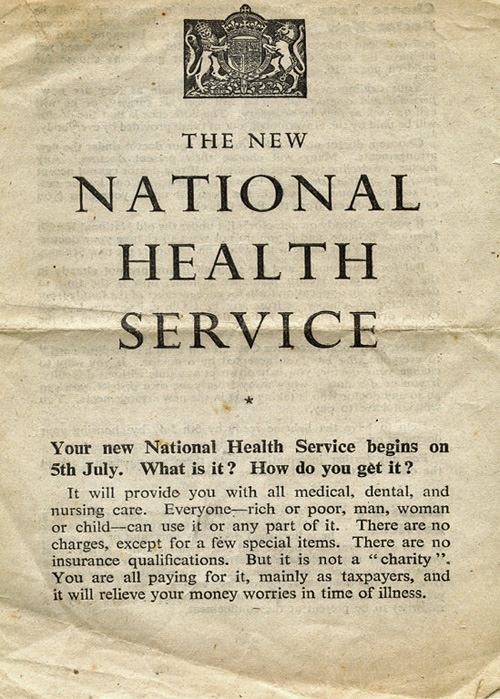 |
| The British National Health Service came into being shortly after World War II. |
Obamacare may eventually "work." In fact, people like me have been rooting for it since it passed Congress and was signed by President Obama in 2010.
Only one thing: The rollout was so disastrous that many, myself included, pressed pause and looked around. Like I said, maybe the PPACA will work, sort of, which is all we expected anyway. Now, however, the stunted rollout let us think back to what we really should have settled for, and that's a single-payer, universal healthcare model.
Henry Blodget in Slate:
The American health care system sucks. We pay more for health care than any country in the world and we only get average results. And tens of millions of Americans have no health insurance. Our latest attempt to address this situation, Obamacare, is a mind-numbing kluge of laws and policies that is off to a very rough start. And even if Obamacare ends up working, it will only fix part of the problem.
The problem, as a ground-breaking article by Steve Brill made clear, is that America's health care providers and insurers treat people differently. If you're lucky enough to be included in a big insurance plan provided by a huge entity with a lot of negotiating leverage (such as the federal government), you pay low rates and low prices. If you're unfortunate enough to be in a high-risk group or not to be included in any plan, you pay sky-high prices. Or you get all your "health care" from the emergency room and, thus, lay the costs off on everyone else that way.
The answer, as Brill's article also made clear, is a fully national health insurance system, in which all Americans are covered in the same massive group and for-profit insurers and health care providers can't pick and choose who to cover and how much to charge them. This system would effectively extend the current Medicare and Medicaid system to the whole population, and, in so doing, make it even more efficient.
As in some other countries with national health insurance, Americans insured under this system would also be free to buy additional health care services, including additional private insurance. The system, in other words, wouldn't limit anyone's ability to pay for "premium" health care services if they chose to.
But a lot of Americans still hate that idea. They have been told since birth that "national health care" is a disgrace. They have been brainwashed so thoroughly by America's vastly profitable medical industrial complex that their resistance to reality and change has become a religion.
Blodget goes on to relate the experience of one American expat in the UK who knows firsthand how good the National Health Service is, in spite of the endless false propaganda over here. And those of us who have lived and worked abroad -- in my case Europe in the early 70s and Japan in the late 80s -- know how well national, single-payer, government-run healthcare can be, whether tightly regulated insurance or private doctors and hospitals are in the mix. There are a lot of ways to deliver universal healthcare successfully. America's just not one of them.Anti-change advocates don't assess facts. They just claim, absurdly, that America currently has "the finest health care system in the world" and then cite horror stories about sick people dying in streets because they have to wait so long to get the (terrible) health care services available to them under "socialist" health care. (This horror story, naturally, is presented as the polar opposite of our current system, In fact, in many ways, it's similar. Today, in America, many people without health insurance spend their lives waiting until they get so sick that they can go wait in emergency rooms. And then our often wildly profitable hospitals pay for their care by, effectively, sending their bills to everyone else.)
And, I hate to say, neither is Obamacare. But we knew that. For progressives -- and for quite nearly the rest of the developed world -- Obamacare represented "the best we could do under the political circumstances." Now we know from the rollout and the first reports of some of the prices in the individual markets, along with the deviltry the insurance companies and perpetrate during the ensuing confusion, not to mention the chaos created by the red states' purposeful refusal to cooperate with the program, that Obamacare was destined to come to life in this pathetic way.
It might still work out and "make things better." And progressives should not stand in the way of the rollout. But we owe it to the country to keep repeating, in every venue possible, that we knew all along that the single-payer universal model was superior. And we still want it and will fight for it.



Thank you for nice sharing
ReplyDeleteHEllo Calvin,
ReplyDeleteThis is a nice article you have wrote. Health is an assets for the human. To taking a good care follow a rules. Thank you for your nice sharing.
it has been observed that the majority of countries in world have a demand for skilled healthcare professionals. In addition to this shortage, the need in a wide range of fields, allows a trained health worker to choose his work location. There is an obvious trend of healthcare professionals migrating to countries like UK for a plush healthcare job.
ReplyDeletehttps://smartmedigapplans.com/
The aging population is influencing the healthcare delivery. There is increased demand for primary care of people over 65 years and for chronic care of people over 75.Winstrol kaufen
ReplyDeleteVery great post. I simply stumbled upon your weblog and wanted to say that I've really enjoyed surfing around your weblog posts. After all I will be subscribing to your rss feed and I am hoping you write once more very soon! PLEase coming site 192.168.l.l
ReplyDelete